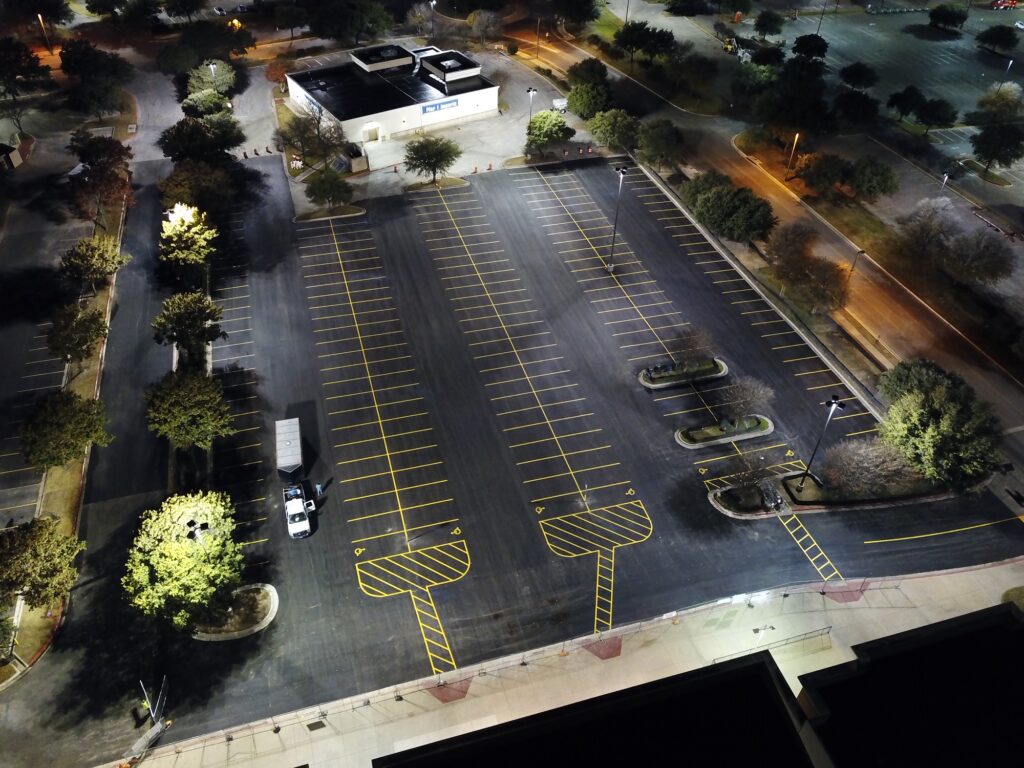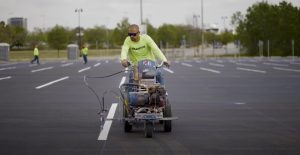Many asphalt contractors who launch their own business initially focus on residential driveways, tiny parking lots, and other small projects. These projects do not require large crews, a lot of expensive equipment, extensive training, or years of experience. Gradually, the contractor tackles more complex projects. As he gains more experience, he may start doing industrial paving. To the uninitiated, one expanse of asphalt pavement may look almost identical to another. If you explore what lies beneath the surface, however, you will understand why industrial paving projects can be complicated.
How Do Asphalt Contractors Build Industrial Pavements?
Industrial pavements must support heavyweight vehicles, often in great numbers. This places an enormous strain on the pavement. To give you some insight into the stresses involved, 9,600 cars cause about the same pavement wear as one truck that is fully loaded. A fully loaded tractor-trailer weighs as much as 80,000 pounds. If you include vehicles of all sizes, the average weight is less than 3,000 pounds per car, so 9,600 cars would weigh more than 28 million pounds. These numbers make it easy to understand why an industrial pavement may need an asphalt overlay much sooner than a residential driveway.
On any asphalt paving project, the first thing that a contractor must determine is the number and types of vehicles that will drive or park on the pavement. His second goal will likely be to evaluate the soil that will lie under the pavement. Different types of soil have different properties. For example, soil with a high percentage of clay will shrink during droughts and swell during rainy seasons.
Armed with knowledge about the expected traffic and the stability of the underlying soil, the paving contractor can then determine the answers to the following questions.
1. Is the soil strong enough and stable enough to support the pavement properly? If not, the contractor may need to amend the native soil.
2. What drainage issues are present at the site? The contractor will need to evaluate both subsurface and surface drainage. A saturated subgrade will lose stability and strength, making the pavement more susceptible to breaking under loads. At the very least, the property owner will likely need to increase the budget for a copious amount of crack sealer and filler.
3. How rocky is the site? Compaction is essential if the pavement is to have the strength to bear heavy loads. Depending on their size and composition, rocks are difficult or impossible to compact sufficiently, so the contractor will need to remove them.
4. What is the best design for the base? After compacting the subgrade, the contractor will construct the base. The base may include an asphalt course directly atop the subgrade. The contractor can then install one or more courses of crushed aggregate and compact it.
5. How many layers of asphalt should the design include? Every asphalt pavement consists of multiple layers of asphalt, and each layer must be properly compacted. If there are too few layers, the pavement will not have the strength to withstand the loads. However, too many layers increase costs unnecessarily.
As you can see, industrial paving can be complicated. However, Alpha Paving has the experience, skills, and equipment to handle even the most complex project. Alpha is a full-service asphalt company serving customers in Round Rock and Central Texas. We are known for exceptional workmanship, exemplary customer service, and highly competitive prices. Our services include commercial paving, parking lot maintenance, asphalt and concrete repairs, thermoplastic pavement striping, asphalt milling, asphalt sealcoating, and street maintenance. Our customers include various municipalities, health care facilities, property management firms, churches, shopping centers, office complexes, college campuses, retailers, hotels, restaurants, airports, and apartment complexes. If you are interested in a free quote, call us at 512-677-9001 or complete the online form.






